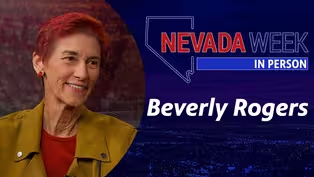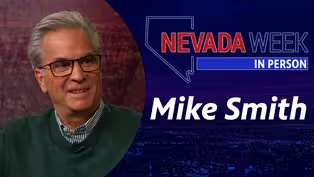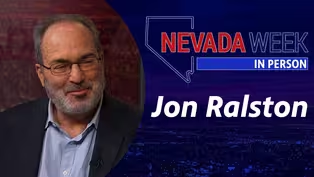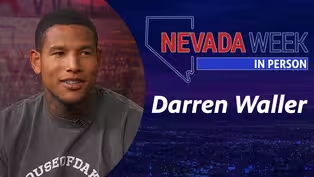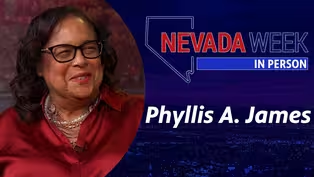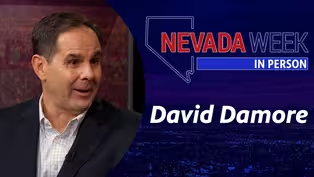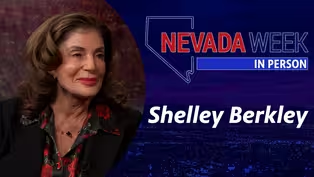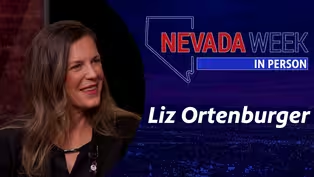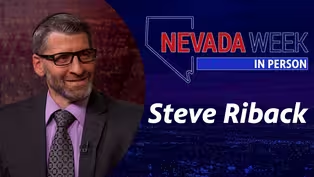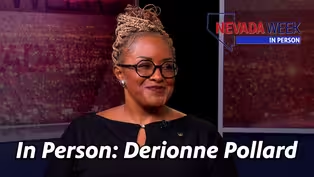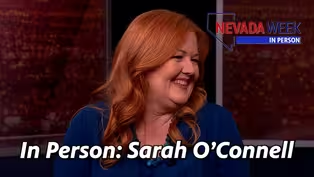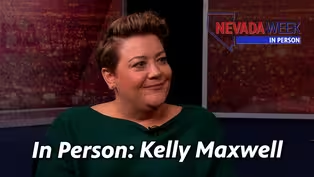
Nevada Week In Person | Shanta Patton
Season 1 Episode 12 | 14mVideo has Closed Captions
One-on-one interview with Las Vegas real estate agent Shanta Patton.
One-on-one interview with Las Vegas real estate agent and homeownership advocate Shanta Patton.
Problems playing video? | Closed Captioning Feedback
Problems playing video? | Closed Captioning Feedback
Nevada Week In Person is a local public television program presented by Vegas PBS

Nevada Week In Person | Shanta Patton
Season 1 Episode 12 | 14mVideo has Closed Captions
One-on-one interview with Las Vegas real estate agent and homeownership advocate Shanta Patton.
Problems playing video? | Closed Captioning Feedback
How to Watch Nevada Week In Person
Nevada Week In Person is available to stream on pbs.org and the free PBS App, available on iPhone, Apple TV, Android TV, Android smartphones, Amazon Fire TV, Amazon Fire Tablet, Roku, Samsung Smart TV, and Vizio.
Providing Support for PBS.org
Learn Moreabout PBS online sponsorshipMore from This Collection
Nevada Week In Person goes beyond the roundtable discussion of Nevada Week with guests for a more casual conversation about their personal passions, new projects and compelling stories that are overlooked in the flurry of the news cycle.
Nevada Week In Person | Beverly Rogers
Video has Closed Captions
One-on-one interview with Rogers Foundation chair Beverly Rogers. (14m)
Nevada Week In Person | Mike Smith
Video has Closed Captions
One-on-one interview with Las Vegas Sun political cartoonist Mike Smith. (14m)
Nevada Week In Person | Jon Ralston
Video has Closed Captions
One-on-one interview with The Nevada Independent CEO Jon Ralston. (14m)
Nevada Week In Person | Darren Waller
Video has Closed Captions
One-on-one interview with Las Vegas Raider tight end Darren Waller. (14m)
Nevada Week In Person | Phyllis A. James
Video has Closed Captions
One-on-one interview Phyllis A. James. (14m)
Nevada Week In Person | David Damore
Video has Closed Captions
One-on-one interview with Chair of the Department of Political Science at UNLV David Damor (14m)
Nevada Week In Person | Shelley Berkley
Video has Closed Captions
One-on-one interview Senior Vice President for Touro University Shelley Berkley. (14m)
Nevada Week In Person | Liz Ortenburger
Video has Closed Captions
One-on-one interview with SafeNest CEO Liz Ortenburger. (14m)
Nevada Week In Person | Steve Riback
Video has Closed Captions
One-on-one interview with Las Vegas Metro Police Lieutenant Steve Riback. (14m)
Nevada Week In Person | DeRionne Pollard
Video has Closed Captions
One-on-one interview Nevada State College President DeRionne Pollard. (14m)
Nevada Week In Person | Sarah O’Connell
Video has Closed Captions
One-on-one interview with Director of Eat More Art LLC Sarah O’Connell. (14m)
Nevada Week In Person | Kelly Maxwell
Video has Closed Captions
One-on-one interview with Baby’s Bounty Executive Director Kelly Maxwell. (14m)
Providing Support for PBS.org
Learn Moreabout PBS online sponsorship♪♪♪ Support for Nevada Week In Person is provided by Senator William H. Hernstadt and additional supporting sponsors.
(Kipp Ortenburger) The Las Vegas housing market has been hot lately with skyrocketing prices.
It has come a long way since the depths of the Great Recession.
Well, someone who saw its collapse and return is Shanta Patton.
She's a local real estate agent, but she does a lot more than just sell homes.
She's also dedicated to closing the gap between black homeownership and white homeownership.
Shanta, welcome.
-Thank you so much; it's great to be here.
-Yes, and we had such a great conversation on the show itself, and I want to continue a little bit of that conversation too and come back to this wealth inequity issue.
You know, a lot of shows, whenever we talk about any social inequity, when we talk about any economic inequity, it always comes back to wealth equity being one of the key factors here always.
What are some of the other barriers you see in addition to just homeownership that are prohibiting that wealth equity?
(Shanta Patton) You know, a lot of it comes with education and how expensive education is for minorities, and that comes back to wealth.
They do not have that benefit of family being able to pull equity out and pay for their education.
So along with that education comes the burden of student loans, and it sticks with you for so long.
It affects your way of living even after you've gotten that job that you have been waiting so long to get.
So things like that make it very difficult, in addition to lending, malpractices of lending, and those sorts of things.
You know, we constantly have a barrier of lack of education, financial literacy, income and down payment assistance options.
There's so many different struggles all at once.
It's really hard for us to figure out how to tailor it down to what we have control over.
-And something we talked about on the show too is just having equity in positions of influence in policy.
This obviously leads to having maybe a state legislature and even some of our municipal leadership that is reflective of the communities they serve which would be, you know, definitely a percentage of black and African American that we don't see those same ratios.
Do you think that's one of the main solutions?
-It is.
You have to be able to have a seat at the table as well as a voice to be able to change the mindset that is so old.
And in order to do that, you have to have diversity on every level that makes a decision for the people of Nevada.
They have to look like the community, and we struggle with that and it is a big battle, and we see a little progress but we need progress faster in order for us to combat the issues we're dealing with.
-Let's talk more specifically about the real estate industry in general.
I mean, is it representative of the populations we see?
-No.
-Not at all.
-It's not.
NAR, the National Association of Real Estate Brokers, says they have 1.4 million members, and out of that 1.4 million members, less than 6% of them are people of color, specifically African Americans.
-So what's the barrier there?
Why aren't we see more professionals in that?
-I think that as children, again we come back to that lack of homeownership means you breed less entrepreneurs.
So being able to go from the concept of an employee to a business owner and the barrier of the cost of getting into the business and being 100% commission, you know, it's a lot of different things that have a lot to do with it.
And it has been a good ol' boys club, and it has been a white industry for so long, and there has not been any intentional effort to bring minorities in up until the last year or two.
-I mean, are you seeing hints of a shift?
-I do.
I see it in hints of leadership being people of color on a national level, and I think that's where it starts.
-I want to get a little more personal too back to the conversation.
You are a HUD certified-- Housing and Urban Development certified housing counselor.
I want to talk to you about some of the things you hear, some of the struggles that you or your clients are facing.
-You know, the big thing is credit, credit recovery, and the lack of income to be able to put aside to help recover it and pay your day-to-day bills.
The other is the lack of knowledge and the misinformation.
A lot of them don't come for the help because they automatically think I'm nowhere near, you know, the point where I can even get the help, and that's the lack of information thinking that you need 20% down instead of 3%.
So we combat the mindset and the lack of information more than anything.
-Lack of credit, is it just the lack of credit?
I mean, we see so many short-term lending facilities here in the area.
I mean, is that a big part of that?
-Especially in a black community, there are more short-term lending companies than are banks in our community, and that's an issue.
-I want to know your perceptions.
We talked a little bit about this, but we didn't really talk a lot about Make Homes Possible, the coalition itself.
We talked about a lot of the resources, but not the coalition itself, which is a multi-agency coalition.
You've got community-based members.
You've got cities and municipalities in there as well; you've got chambers.
I want to ask your perspectives on our community in general.
How good are we at collaborating and developing coalitions like this?
-I think we're awful at it.
and it is very difficult because each agency has their purpose of being here, their source of funding and what they need to do to survive and keep their lights on.
So when a lot of us do the same things, it can sometimes conflict and then we all think we can do the rat race on our own.
That's why Make Homes Possible is so unique, because we are thought leaders in the community, and we put aside all those things to come together for one purpose.
-Well, let's talk about there's obviously a lot of other coalition building that needs to be happening so those that are listening that might want to develop a similar coalition, what are some of the key things that made your coalition so successful?
And you are, I want to mention, one of the cofounders of this.
-I am.
I think what makes it so successful is one, we all had a common purpose, and because we are boots on the ground, we understood what the issue was.
We didn't try to tackle the bigger issue of policy.
We just wanted to get belly-to-belly with the community and ascertain what we could do in our small capacity specifically for them to do that part, and I think that's why we're seeing the success.
-When I hear coalition, I definitely think policy and policy influencers, so that might not have been first stage but is that kind of part of the strategic plan going forward?
-It is.
We will move policy once we can show them that look, belly-to-belly is how we change this and we need you to help us with the policy so we can spread this out a little bit more.
-Interesting.
You're raising several children, lived in Las Vegas for a long time.
I want to get your ideas on just what it's like to raise a family here, and let's start with some of the benefits of raising a family in the Las Vegas Valley.
-I love this valley.
It has been good to me, it's been good to my children, although people think it's, you know, what happens in Vegas stays in Vegas, this is a family oriented community.
There's a park on almost every corner, you know, and that solidifies who we want to be as a community.
So I think the options of charter schools is so great and beneficial for the kids.
The sports and us being able to have so much summer and warm time allows for so many different sports options.
There's always something to do with the kids whether it's indoors or out in nature.
We love nature, and we have the best benefit of that here.
-It's true.
Accessibility is something that I think Las Vegas has done really well, and I've lived in other parts of the U.S. too.
Just having close access to diapers, you know, and a pharmacy-- -On every corner.
-Yes.
I mean, it's amazing how much difference that makes.
It really does.
-Absolutely.
-Well, let's go the other side then, maybe some of the barriers or challenges you think of raising a family here.
-I think a lot of the barriers come with how transient this city has become, and it makes it difficult for you and your kids to have long-lasting relationships.
You know, because kids are coming in and out, there's this constant movement, it makes it difficult, I think, for kids to set down roots as much.
So we have to be very intentional about how we socialize them and the things that we put them a part of that we know it's going to be a long-term thing so they don't feel it as much.
-Yes, it's true, and of course that road leads back to homeownership as well and more stability in the community.
-Yes, and the renting versus homeownership and knowing you can be there for 20 or 30 years if you want.
-Yes.
I want to talk a little about your pets.
We were talking about this in the green room.
You have a pet desert tortoise.
That surprised me.
I mean, just generally speaking what's it like, and you have dogs too.
So make a comparison there or a contrast between having dogs and having a tortoise as a pet.
-He is very fun.
His name is Zeus, and his habitat is Mount Olympus; he's the king of gods.
He is very human focused.
He brings a different dynamic to our household of floppy dogs.
You know, he gets along very well with them, but it gives us pride because we know that he belongs to the state, so there was a call to action.
They needed help.
We took that on, and we are proud of raising him and giving him what he needs.
He lives off the Earth, so he doesn't require a whole lot.
So what he gives us is full entertainment, and he's very personable.
-And it's funny because I don't think entertainment and tortoise are usually used in the same sentence.
So that might be a surprise to people, that tortoises have personalities.
-They have huge personalities.
He will come when you call him.
He loves to get his neck rubbed.
You know, he just wants to be in the mix.
He walks around the dogs.
He is a part of our family completely.
He's fun.
-And as we were talking about earlier too, this is hibernation phase for tortoises.
So for a certain amount of months out of the year, you don't necessarily have the tortoise.
-We don't.
We get him for about four or five months out of the year, and the rest of the time he is asleep, so we make the most of it.
Our friends come by to see him.
We let them know he's going to be asleep soon, and they will come by to see him.
He's a fun animal to have, you wouldn't think, and very low maintenance.
So I suggest people, you know, take on that challenge and bring a tortoise home.
-And I don't mean to put you on the spot, but if somebody were, do you know the resources that we would access?
-I do: tortoisegroup.org.
So Tortoise Group is where you go.
They will tell you how to prepare your yard, what plants to put in.
You got to Star Nursery, they will help you out and then the Tortoise Group will deliver you a wonderful tortoise who might or might not be a girl.
You don't know it at that time, you know, but be prepared because they will outlive you.
They can live 85 to 100 years, so be prepared when you take it on that you have a succession plan and you want it to be a part of your family for a long time, a generation essentially.
-Absolutely, great advice.
Okay, so a couple of short questions here.
I hope you like this first one.
Most intriguing or exciting neighborhood to buy or sell a home in Las Vegas.
-So I would say the Rancho-Alta area because those homes are so unique, and some of them have never been resold before.
So they have been there from the beginning of time, and I think it's one of the most unique neighborhoods in the city.
-A true Las Vegas experience is... -The Mob Museum.
-Really?
-You need to see our history, see how far we've come from that.
We've completely pivoted.
So see our journey.
-True, very good.
Nevada's most important asset is... -The community.
Our most important asset is our community.
-One word: What do we need more of?
-Free parking.
-Isn't that true?
We just keep reducing the amount that we have.
What do we need less of?
-Traffic.
-Traffic?
-We need less traffic and affordable housing.
-And affordable housing, yes.
Next big thing in Las Vegas will be... -I think we will continue to evolve.
I think we will step back even more from tourism and diversify who we are and what it means to live in Las Vegas.
I think North Las Vegas is a great example of that, you know, what they've been doing.
I think we will expand to many other fields, and people will find different reasons to come live here.
-That's an interesting point.
Where would you like to see Las Vegas go then?
I mean, if we were to add another industry, an industry so we're not so dominant on tourism maybe, what would that be?
-Honestly it might sound crazy, but I'd love to see us get into the film industry.
I think we could take that on.
-Well, wonderful conversation.
Thank you so much.
-Thank you.
-We appreciate it.
The conversation we had with Shanta is about the efforts underway now to address inequality in homeownership.
Please go to our website at vegaspbs.org/nevadaweek or tune in on Sunday at 5:30 p.m. and Tuesday at 7:30 p.m. for both of those conversations.
Thanks for joining us; we appreciate it.
♪♪♪

- News and Public Affairs

Top journalists deliver compelling original analysis of the hour's headlines.

- News and Public Affairs

FRONTLINE is investigative journalism that questions, explains and changes our world.












Support for PBS provided by:
Nevada Week In Person is a local public television program presented by Vegas PBS
